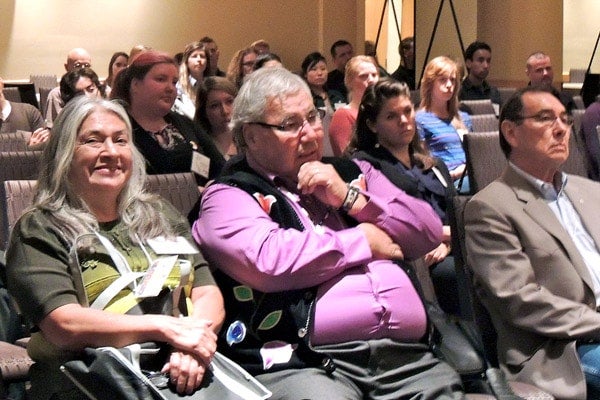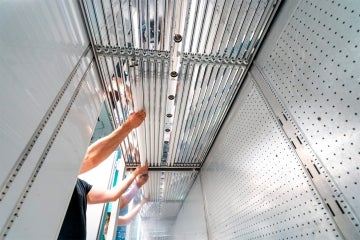
The Meeting Place with Lee Maracle
Published: June 14, 2012
The Toronto Council Fire Native Cultural Centre and the Canadian Roots team from the Centre for Aboriginal Initiatives at the University of Toronto recently hosted “The Meeting Place -Truth and Reconciliation Conference”.
Aimed at promoting respect, education and engagement about Indian Residential Schools, the gathering included members of the Truth and Reconciliation Commission - the Honourable Justice Murray Sinclair, Marie Wilson and Chief Wilton Littlechild - as well as Assembly of First Nations Ontario Regional Chief Angus Toulouse, National Chief Shawn A-in-chut Atleo and former National Chief, Ovide Mercredi.
The event featured a parallel Youth Conference attended by 126 Native and Non-Native youth and a wide range of speakers, panels and workshops addressing the issues and challenges of building positive relations across diverse communities.
Writer and University of Toronto alumnus Christine McFarlane spoke with Lee Maracle, Aboriginal Studies Instructor, traditional teacher and renowned author, about what it was like to participate in the conference.
How do you feel about the Truth and Reconciliation Conference?
I have mixed feelings about the conference because the first thing that I am cognizant of is that it's not actually reconciliation because none of the people making statements or testimony to the Commission is allowed to name the abusers, none of the people that did this to them is going to be charged, and none of the people that did it is required to face the people they hurt, so I’m not sure where the reconciliation is coming in.
All that is happening is that a lot of survivors were giving testimony to what happened to them. A lot of youth were there listening to the stories, and so that really made me feel good because the youth got to listen to what happened to a couple of survivors. Organizers also did a lot of empowerment work with the youth and got them to make a declaration to the conference, and the youth want to be educated in both the Western and Indigenous traditions. That was really heartwarming.
Did anything specific stand out over the three days?
The willingness of the survivors to testify. They actually had to get on stage, face the commissioners, and deliver the testimony through a microphone and I think that is very difficult for someone to tell what happened to them in that circumstance. There was an audience of 300 listeners but I believe it did something for them, and it made it real for them, helped them see that somebody cared. That made it very real and that was very positive.”
What do you hope participants will take away from the conference?
I hope that they realize that there were crimes committed. And I think the commissioners did, particularly Marie Wilson. She seems to be leading the commission to recognizing that crimes were committed and she is committed to having that resolved and that became very clear from the testimony, that there was not just abuse, there were crimes, crimes against human beings committed by real other human beings and something needs to be done about it.
This was not something just terrible, it was horrible; it was the worst crimes against humanity, committed against small children. A lot of people made commitments at the conference to do something, to work towards reconciliation in a real way, to rectify the crimes and the abuses that happened at residential schools.”
Scores of First Nations people from across the country attended the event. Does that suggest reconciliation is possible?
Reconciliation between First Nations people and Canada is really different than personal reconciliation. I make that difference because the inequities that were a part of an overall system of colonization has to be undone and colonization itself has to happen on a government-to-government basis. First Nations people need to have an equitable share of this country. There has to be access to the wealth of the land. Canada has to stop plundering our territories. We need an equitable relationship between Canada and First Nations peoples. I don’t think Canada is prepared to do that. This is evident in how the Commission had only one side, one group of people testifying and they’re not allowed to name their abusers. This is an example of Canada’s unwillingness.



